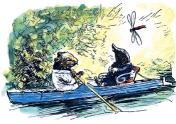As the traveller sees farthest by day, and becomes aware of rugged mountains and trackless plains which the friendly darkness had shrouded from his sight and mind together, so, the wayfarer in the toilsome path of human life sees, with each returning sun, some new obstacle to surmount, some new height to be attained. Distances stretch out before him which, last night, were scarcely taken into account, and the light which gilds all nature with its cheerful beams, seems but to shine upon the weary obstacles that yet lie strewn between him and the grave.
Please read the text in italics above carefully.
Q. 1 Who is the author?
Q. 2 Whose thoughts and feelings is this piece describing?
Q. 3 What is protagonist about to attempt to do?
Send in your answers using the comment facility.
Filed under: Bez kategorii | Leave a Comment
(Click on text above to link to the original Daily Telegraph article, which may have been corrected or pulled since this post was written.)
The above text was caught by capturing the text from part of the Daily Telegraph’s website at 13:41 BST on Tuesday 17 July, 2012.
How many mistakes can you find?
Filed under: Bad English | Leave a Comment
Tagi: Daily Telegraph
Robinson Library, Newcastle University.
(Photo by Andrew Curtis is licensed for reuse under the Creative Commons Attribution-ShareAlike 2.0 license.)
Hard on the heels of the recent post about Brent Council’s plans to close its libraries comes this article by Peter Jones in The Spectator about how Newcastle University Library is dumping its books.
This summer, management started removing books. The reasoning was explained in a loop heralding ‘Phase 1 of the great transformation’ that played endlessly on a TV at the library exit: ‘Welcome back to your refurbished Robinson Library. You asked, we listened… We have moved loads of shelving to make room for more study spaces. We’ve shifted crate-loads of the less-used stock to provide more light, more room and a more comfortable space to study in. And created a greater variety of study areas. Choose the one that best suits your work-style!’ And the final picture — empty chairs with the words ‘Now that Phase 1 is all done, we are just waiting for you to fill the empty spaces!’ Phase 2, it promises for 2012, will continue this noble mission.
If we thought gonk-world was a one-off, this nauseating hymn of self-praise removed all doubt. Forget, if you can, the paradox that a library should create more space by removing books. Instead, ask ‘which books?’ The answer laid bare the full extent of the management’s trahison des clercs: it was celebrating its triumph in removing, from arts and sciences alike, the complete runs of virtually all the academic journals, the central research tool for academics in the humanities and the goal of all committed students. And management was actually boasting about it! They should be grovelling in shame.
Click here for the complete article on The Spectator’s website.
Filed under: Bez kategorii | Leave a Comment
Idioms and expressions
He’s a bit of a rolling stone, He nearly sold us a pig in the poke, but his body language gave the game away. We teased him till he let the cat out of the bag and nowadays we give him the cold shoulder.
Ever wondered how English idioms and expressions came to have their present day meaning? Wonder no longer, The Etymologicon by Mark Forsyth will be published on November 3.
The Etymologicon, is billed as: A Circular Stroll through the Hidden Connections of the English Language. If you want need to know what testicles have to do with testaments, why all dogs are cynical, or how barristas connect to barristers, The Etymologicon is the tome for you.
Amazon UK is taking orders for The Etymologicon (RRP £12.99) at a special pre-publication price of £6.62 (hardback) and £6.29 (Kindle). If you want to take advantage of the offers, click the appropriate link below.
Filed under: Bez kategorii | Leave a Comment
The decline and fall of Sudbury
Crabbs House, Barnham Park, Sudbury, Middlesex. Photo Jo7000.
(Click to see original on Wikipedia.)
According to Gibbon, the Roman Empire succumbed to the barbarians in large part due to the gradual loss of civic virtue among its citizens.
A brief history of Sudbury (dates are approximate)
455 Horsa, having established the Saxon reign in England with his brother Hengist, falls in battle and is buried on Horsenden Hill.
1400 At some point in the 15th C. Sudbury manor ceases to be the London residence of the archbishop of Canterbury.
1846 The Copland sisters commission Sir John Gilbert Scott, the architect who later designed the Albert Memorial and St Pancras station, to build the Church of St John. They also build the neo-Palladian Sudbury Lodge in the grounds of their father’s home, Crabbs House.
1864 George Barham founds the Express County Milk Supply Company,named after the fact that express trains are used to deliver fresh milk to London. He pioneers glass bottles and pasteurization. His dairy business is very successful and with its profits he acquires and improves the Crabbs House Estate, making Sudbury Lodge his family home. He dies in 1913, leaving his business to his son, Titus Barham.
1923 Sudbury becomes the home home of the London Wasps rugby union team.
1927 Titus Barham dies leaving considerable lands for the benefit of the public.
1956 Wembley District Council orders the demolition of Sudbury Lodge.
2002 London Wasps sell their Vale farm grounds for redevelopment
2011 Brent Council announce their plan to close all 6 public libraries in Brent including Barnham Park Library in Crabbs House.
I learnt to read English thanks to Barnham Park Library.
Sic transit gloria Britanniae
Campaign websites:
- Facebook – Stop the closure of Barnham Park Library
- petition.co.uk – Save Brent libraries from closure
Filed under: Bez kategorii | Leave a Comment
Seen in passing
I hold a Certificate of Proficiency in English issued by the University of Cambridge and I have a work experience in English as a professor and translator. My command of English in speaking, reading and writing is very good.
Quite good, I would say.
Filed under: Bez kategorii | Leave a Comment
By coincidence
Who would have thought that just these two words: by and coincidence applied judiciously by James Kirkup in the Daily Telegraph could have led to the resignation of the British Minister of Defence?
The Guardian draws first blood
The Telegraph strikes the fatal wound
Filed under: Liam Fox | Leave a Comment
Common sense?
Musing on the Polish election results
At the end of the 4.50 from Paddington (the 1987 BBC TV adaptation of Agatha Christie’s novel with Joan Hickson), just after the final dénouement, there is an interesting exchange between the rakish Cedric Crackenthorpe and Miss Marple regarding the super-efficient Lucy Eyelesbarrow and his rival for her affections, Bryan Eastley.
Miss Marple. She’s not in love with him yet, of course. I rather think that she’s more attracted to you. But she’ll marry him, and make him what she wants, and then she’ll fall in love with him… probably when she’s expecting their third child.
Cedric. I never realised before that common sense is as powerful an instinct as love, hatred or patriotism.
Miss Marple. How very common sensible of you to realise it.
4.50 from Paddington (BBC TV 1987)
Note how the positive connotation of ‚common’ in common sense, common law and common land can turn to the neutral in a phrase like common sense clothes and can turn to the negative as in: that’s rather common.
So what’s common sense in Polish? Zdrowy rozsądek, perhaps?
Filed under: election | 1 Comment
Translating Polish road names
The following, posted on W-wa Jeziorki, should be sent to every translation agency in Poland.
A note on Polish road-naming. Most roads or streets are simply ‚ulica’ (pronounced „ooLEETsuh”, abbreviated to ‚ul.’). The word ulica means street, although there’s no need to translate it into English (any more than one needs to translate strasse from German into English or rue from French into English as ‚Road’).
Plac (abbreviated to Pl*.) in Polish is ‚square’ (as in the French place or German Platz). There’s also skwer (as in the English ‚square’), though these are rare in Warsaw. Roundabouts are rondo (neither skwer nor rondo are abbreviated).
So Aleje – from the French and German Allee. We have Aleje (plural) and Aleja (singular). So – Aleje Jerozolimskie, but Aleja Stanów Zjednoczonych (both are abbreviated to Al.*). Allee in English is ‚avenue’ – but then so is avenue. Aleje Jerozolimskie in English is exactly that. Rue St. Michel doesn’t need to be translated, nor does Bahnhoffstrasse. So hey, Mr Translator, no Jerusalem Avenue, please!
Filed under: road names | Leave a Comment







